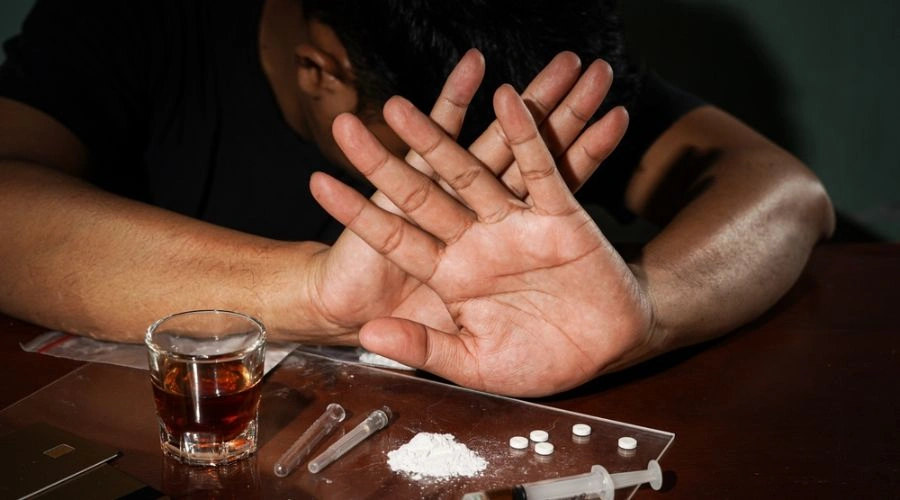What Does It Mean When Someone Is Feening for Drugs?
No matter how it’s spelled – feening, fiening, feining, or fiending – this word describes intense cravings for your substance of choice. Fiending for drugs is more than a mental state. Drug cravings can take over your body and mind, making it hard to focus on anything else but getting your next fix.
Feening for drugs is street slang, but it describes the very real clinical condition of craving certain substances when you quit using them, whether you just don’t have access or are trying to change your life.
At Ingrained Recovery, we support you through withdrawal, helping you stop feining and start living your better life.
Is the Actual Word Feening or Fiending?
While it’s hard to say exactly where street slang originates from, the many spellings of the word “feening” might refer to a “fiend”. A “drug fiend” is a term used to describe a person overtaken by intense cravings. They might act erratically or desperately in their pursuit of addictive substances, even being willing to participate in illegal activities like stealing money or lying to obtain drugs.
When the term fiend refers to drug-seeking behavior, it’s rarely meant positively. “Feening” reflects the stigma surrounding addiction, criticizing the addiction while looking past the psychological compulsion that is driving their behaviors.
Ingrained Recovery works hard to get rid of this stigma in a comfortable, judgment-free environment. Here, you never have to feel ashamed for deciding to seek professional treatment.
Get Effective Detox and Rehab Options
Find Help At Ingrained Recovery
Why Does Drug Addiction Cause Fiending?
Drug abuse changes how your body experiences positive feelings. No matter your substance of choice, it interacts with your brain’s reward system. Your brain gets a reward, in the form of pleasure, when you use, triggering all those feel-good neurotransmitters.
The problem is that as substance use disorder develops, it’s harder to get those feel-good chemicals without that drug. This is when you’ll experience feening for drugs. While the word fiend (as well as in the form of fiending) is a slang term for being addicted and actively seeking your next drug, the reality for users is that it is your brain screaming for those chemicals that it’s become accustomed to.
The Physical Aspects of Addiction
Feening for drugs is often thought of as a mental issue, but your body craves these chemicals, too. It changes your entire system, blocking out pain and changing sleep and appetite habits. The physical addiction that accompanies substance use disorders is responsible for the withdrawal symptoms you’ll experience when you suddenly quit using drugs.
The Mental Aspects of Addiction
For people whose drug addiction starts following anxiety, depression, or trauma, drug cravings come from your mind begging for relief. You develop an emotional dependence on these substances that feels impossible to break.
This is the reason mental health support is a critical part of recovery. It’s much harder to fight against the urges accompanying drug or alcohol addiction when you’re battling your own mind.
Is Craving Drugs in Recovery Normal?

You didn’t develop substance use disorder overnight. Similarly, it’s going to take time for you to learn to overcome substance abuse cravings. Even years after recovery, certain people, places, situations, or stresses might trigger you.
You will feel more in control of overcoming these triggers with the right treatment, but you’ll still experience that urge to obtain drugs. This is why ongoing therapy, support meetings, coping mechanisms, and a structured, healthy lifestyle are all key parts of long-term recovery.
Intense Drug Cravings During Withdrawal
After using any substance for too long, you’ll have a mental and physical dependence. This is true of drugs like meth, heroin, or cocaine, as well as legal substances like alcohol, nicotine, and cocaine. You just don’t feel like yourself when you don’t have those chemicals in your system.
This gets more severe in the first few days after quitting that substance. While withdrawal symptoms and timeline change depending on the type of drug addiction you’re struggling with, physical symptoms are often most intense in the first 1-3 days, lasting up to a week.
Mental withdrawal symptoms last much longer, up to a month or longer. Intense cravings are most common for the first 90 days after recovery, though they get easier to manage with time.
How Can Someone Get Help That is Fiending for Drugs?
Many people who talk about those who are struggling with addiction as “feening for drugs” don’t understand how powerless someone might feel in repeating compulsive, drug-seeking behavior.
Whether you’re seeking help for yourself or a loved one, you won’t feel stigmatized at Ingrained Recovery.
We believe making our clients comfortable is an essential part of the healing journey. When you feel comfortable, you can share your experiences, thoughts, and struggles without judgment. This level of honesty is an essential part of creating an individualized treatment plan that supports recovery and helps you not obtain prescription medications to alleviate withdrawal symptoms.
Medical Detox: Treating the Physical Symptoms of Detox
Healing from substance use disorder usually starts with medical detox to manage uncomfortable withdrawal symptoms. You’ll also be monitored 24/7 for severe symptoms like seizures, psychosis, or loss of consciousness.
Our medically supervised detox at Ingrained forms the foundation of our treatment options and sets the stage for reduced (and even eliminated) cravings as someone’s stay in rehab increases.
We help manage withdrawal symptoms to make you more comfortable. This comfort gives you clarity as you start learning skills that will help you overcome addiction for good. Over time, medications for substance use are cut back. This gives your body time to adjust while also reducing the physical and psychological symptoms of withdrawal.
Medication-Assisted Treatment for Intense Cravings
Sometimes, addiction medicines are recommended as part of our comprehensive addiction treatment programs at Ingrained Recovery. In early substance abuse recovery, intense cravings can make it hard to stay on your chosen path, despite negative consequences.
Certain medications can quiet these cravings, making it easier to use healthier coping strategies. As you get more comfortable in your ability to overcome addiction, you won’t need to rely on them as much. Your dose will be tapered, meaning it is slowly lowered so that you don’t experience intense withdrawal symptoms when you quit using.
Evidence-Based Treatments

Countless American communities have been affected by drug addiction, with the earliest issues starting with morphine and opioid drugs in the late 1800s. With such a long history and extensive research, it’s been easier to learn what treatments do and do not work.
Ingrained Recovery stays up-to-date on all the latest evidence-based treatments recommended by the Substance Abuse and Mental Health Services Administration. We utilize this in our holistic, whole body approach and the many therapeutic approaches used at our facility.
Individual Therapy
One-on-one counseling helps people with severe addiction understand what caused drug use in the first place. While there’s no single cause of addiction, many people have triggers, such as life circumstances, existing mental disorders, or trauma. As you learn what triggers you, you’ll also develop coping strategies to manage these triggers.
Some of the more common therapies include cognitive therapy (CBT), dialectical behavior therapy (DBT), and motivational interviewing. CBT teaches you to manage negative thinking that influences substance use cravings, while DBT helps you manage intense emotions and distress.
Motivational interviewing helps you find reasons to seek sobriety from drug use and stay focused on your goals. Of course, the most effective treatment strategies will change depending on what you need to heal.
Group Counseling
In group therapy sessions, you’ll be able to talk about everything from the symptoms of feening to risky behaviors or psychological symptoms you might be struggling with. And, it’s hard to feel stigmatized when you are surrounded by people who are also struggling with drug misuse.
As you get more comfortable sharing, it also builds your confidence in participating in community support groups after leaving rehab. Relying on the addiction community is an important part of relapse prevention.
Holistic Therapies
Holistic therapies include everything from adopting a more structured lifestyle to nutritional support. We also encourage you to participate in recreational therapies that provide an outlet when you are experiencing intense cravings. They provide distraction and an opportunity to express yourself.
Get Accredited Treatment Programs
Find Help At Ingrained Recovery
A Long-Term, Personalized Treatment Plan
We don’t look at sobriety as a short-term process. You aren’t just getting sober, you’re rebuilding the rest of your life. Recovery gives you a chance to start over and choose a life that fulfills you. By following your relapse prevention plan, anything becomes possible.
Each element of your personalized plan to overcome addiction supports this future life. And, your treatment plan doesn’t end after inpatient rehab. We help you lay out details of how you’ll set yourself up for success in staying sober after rehab. This includes everything from connecting you with local therapists and psychiatry professionals to helping you find support groups.
Dual Diagnosis and the Nature of Fiending for Drugs
It’s not uncommon for people who’ve developed a psychological dependence on drugs to struggle with co-occurring mental health issues. Sometimes, mental health conditions come before substance use disorder. You’ll use substances to make your brain feel good, which causes feening for drugs when your mental symptoms return.
Other times, psychological symptoms come from struggling with substance use disorder. Drug use alters your brain, its neurotransmitters, and how it functions. You might experience everything from depression, anxiety, and mood swings to sleep disturbances, hallucinations, and psychosis from drug use and withdrawal.
What are the Benefits of Inpatient Over Outpatient Addiction Treatment?

Outpatient treatment has its place in recovery, but for prolonged substance use, residential rehab is best. Inpatient treatment offers the best chance of monitoring and managing what’s likely to be intense withdrawal. Residential is also the better plan if you have co-occurring mental health disorders or struggle with polysubstance abuse.
An added benefit is that you can put some distance between yourself and triggers in the outside world. Inpatient treatment can help you prevent relapse by avoiding triggers. It’s also harder to access drugs if you find yourself having weak moments, which is common in early recovery.
Craving Management and Long-Term Support
It takes time to develop substance dependence, and once you seek treatment for drug use, it’s also going to take time to heal. Intense cravings can be hard to manage during early recovery, but we give you the tools to make it easier. This includes everything from prescription medications that manage withdrawal symptoms to coping mechanisms to help you overcome drug feening.
Ingrained Recovery is also heavily involved in the aftercare process. You’ll be connected with local healthcare professionals and support groups like Narcotics Anonymous, making it easy to find somewhere to turn for help if you find yourself feening or fiending for drugs.
Up To 100% of Rehab Covered By Insurance
Find Help At Ingrained Recovery
Go From Feening to Freedom: Learn to Live Drug-Free at Ingrained Recovery
We understand how frustrating fiending (or feening) for drugs can be, especially when you’re tired of seeing the negative consequences of addiction in your life. You’ll find proper treatment and support alongside de-stigmatized care on our beautiful campus at Ingrained.
Whether feening or fiending, if you or a loved one is struggling, where you choose to get help is critical. Make the right choice for your sobriety and call Ingrained Recovery today. Let us show you how you can build a better future.
References
- https://civilrights.org/blog/americas-war-on-drugs-50-years-later/
- https://www.samhsa.gov/libraries/evidence-based-practices-resource-center

